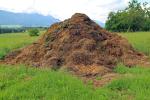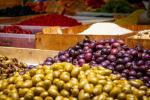Operational Group: Impact of organic inputs on the health of soils in Aragon
- Type Operational group
- Status In progress
- Execution 2023 -2026
- Assigned Budget 119.999,00 €
- Scope Autonómico
- Autonomous community Aragón
- Main source of financing CAP 2023-2027
The main objective of the project is to study the impact of certain organic inputs on the health of different types of soils and crops, analyzing different strata and depths.
In addition, this project seeks other purposes such as:
- Improving soil quality: They contribute a high percentage of quality organic matter to the soil, which increases the biological activity of microorganisms and improves soil structure. They also provide key nutrients such as nitrogen (N), phosphorus (P), and potassium (K), as well as other micronutrients necessary for plant development.
- Erosion reduction: Organic matter acts as a soil stabilizer and improves its structure, which reduces erosion. Root development: The nutrients from organic inputs and the beneficial microorganisms they contribute to the soil, such as bacteria and fungi, contribute to plant root development and, therefore, plant growth. Furthermore, the organic matter contributed by organic inputs improves soil water retention, which also promotes plant growth.
The project results are expected to improve:
- Productivity: Organic inputs provide nutrients, improve soil structure, and promote microbial activity, increasing crop productivity and quality.
- Economic and social viability: Reducing dependence on chemical fertilizers reduces costs and improves profitability. An organic approach can generate additional demand and economic benefits, in addition to contributing to environmental conservation and consumer health.
- Technical feasibility: Rigorous sampling and analysis protocols ensure reliable data. Experts in agronomy and soil health design and execute project activities.
- Environmental Sustainability: Organic inputs reduce dependence on chemical fertilizers, improve soil structure, increase water retention, and promote biodiversity, contributing to the conservation of natural resources and environmental protection.
- A.1: Design sampling and analysis protocols. Define variables of interest to determine locations (based on soil type, crop, and agricultural practice) and sampling frequencies. Establish appropriate sampling strategies to obtain representative samples. Develop a data analysis plan using statistical tools.
- A.2: Development of experimental trials in pilot plots. Apply different organic inputs in selected plots and monitor soil parameters. Establish the equipment and materials necessary for sample collection, avoiding cross-contamination. Transport and store samples in the CTA laboratory. Soil characterization. Take representative samples of the soil under study (3 composite samples/zone). Conduct initial and post-harvest sampling to assess the impact of inputs.
- A.3: Analysis and validation of results. Regular monitoring to evaluate the effectiveness of organic inputs (analysis of chemical and physical changes in the soil). Visual inspections of plants and the environment. Detailed recording of observations and results. Monitoring crop yield and adjusting input dosages based on the results.
- A.4: Dissemination of results: Communication strategy, identifying key audiences and messages. Technical reports summarizing project results. Organizing seminars and conferences to present findings. Creating visual and educational materials for accessible communication. Participating in agricultural fairs and exhibitions to showcase results. Using media and social media to disseminate results.
Soil health is a key factor for the sustainability and productivity of agriculture and livestock farming. Soil health is of great importance for obtaining high-yielding crops that allow for the harvest of high-quality products. Several factors determine whether healthy soil is more resilient to certain constraints, such as pests and diseases. Resilient soil is one that is able to maintain or recover its healthy condition in response to these constraints. Among the main tools of the European Green Deal in the agricultural sector is the Farm to Fork Strategy, which aims to design a fair, healthy, and environmentally friendly food system.
This strategy imposes very ambitious environmental objectives, including one related to fertilization and the healthy agronomic condition of soils. This situation requires special attention to the management of materials applied to the soil, in order to promote the implementation of a more sustainable food system, capable of reducing the negative impacts of fertilization while ensuring profitable production for farmers, with sufficient and varied food at affordable prices—essential to guarantee food security in times of economic crisis.
In 2022, the Royal Decree on Sustainable Nutrition of Agricultural Soils was published to regulate the management of slurry and other organic fertilizers in Spain. This decree establishes the foundations for proper management of livestock waste and fertigation, and promotes the use of organic fertilizers. It also establishes the need to conduct soil analyses and assess the nutritional needs of crops before applying any type of fertilizer.
The main objective of the project is to study the impact of certain organic inputs (slurry, manure, pruning waste, etc.) on soil health, examining how the application of different inputs in different areas and on different crops affects them.
- Coordinator/entity name: REGIONAL PORCINO SANITARY DEFENSE ASSOCIATION NO. 2 OF THE EJEA SWINE REGION
- Postal address: CARRETERA DE ERLA, 43, 50600, ZARAGOZA
- Coordinator/entity email: centrogestor@ads2porcino.com
- Telephone: 976662526
- ASOCIACIÓN DEFENSA SANITARIA Nº 2 COMARCAL PORCINO DE EJEA
- UNIÓN PEQUEÑOS AGRICULTORES DE ARAGÓN (UPA-ARAGÓN) (upahuesca@upa.es)
- SILVIA VIÑADO HERRERO (silvia_vh83@hotmail.com)
- FERNANDO FAU BERGUES (fernandoalera@hotmail.com)
- ASOCIACIÓN DEFENSA SANITARIA Nº 2 COMARCAL PORCINO DE EJEA





